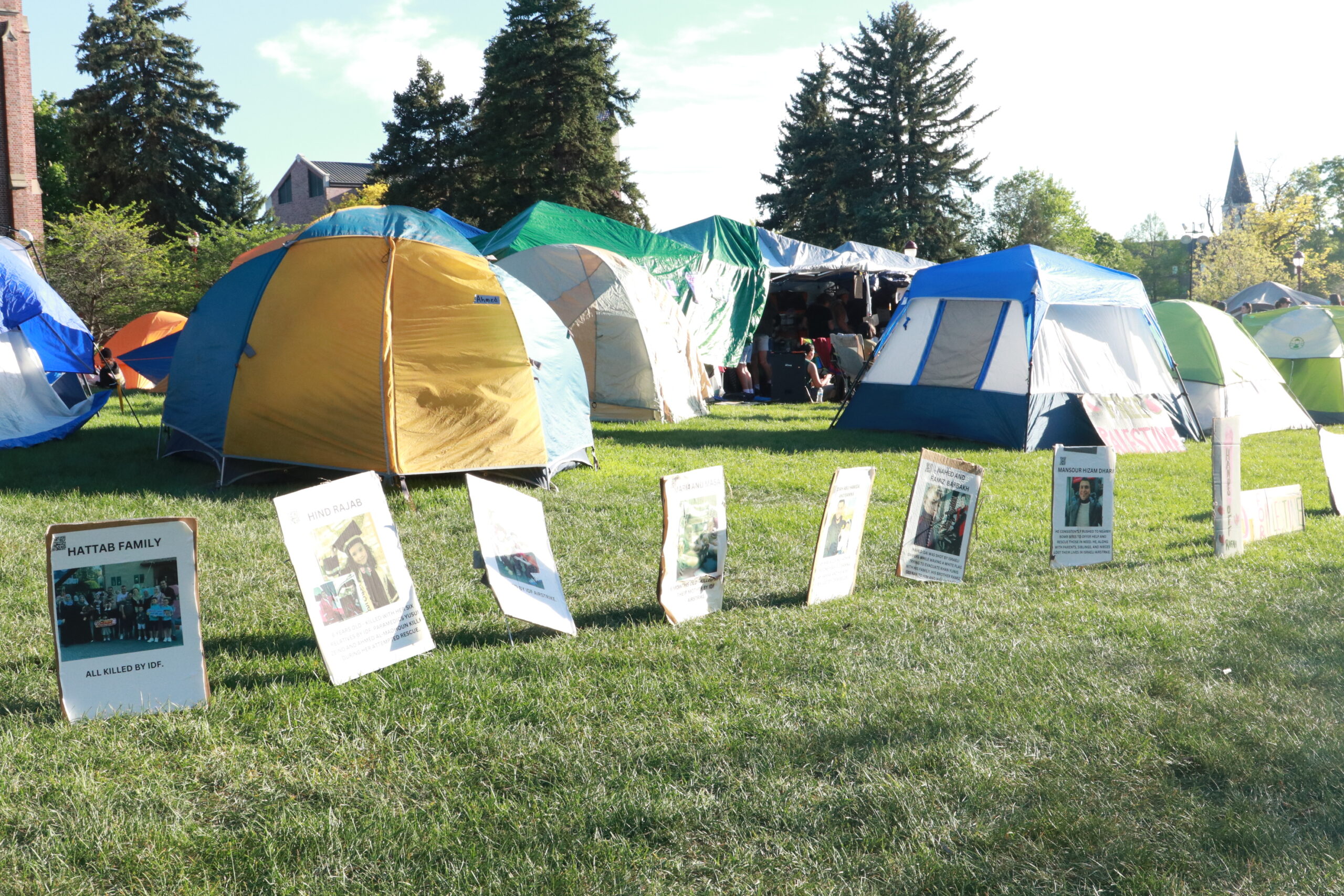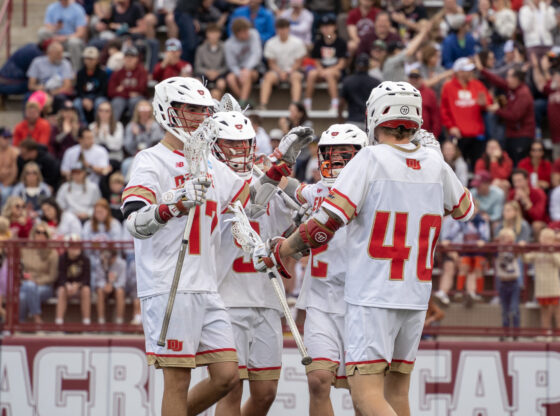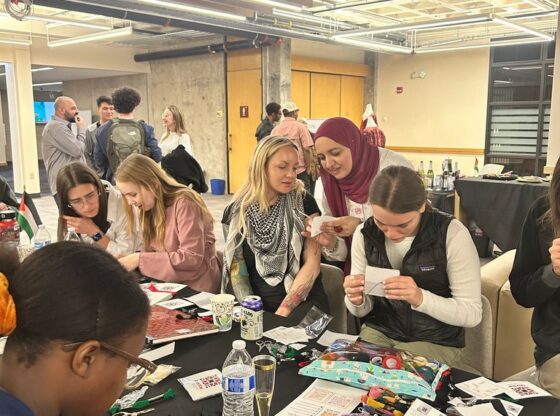 Photo by:
Photo by:
With a new hit music video and a new album to promote, rock band OK Go has been touring and tomorrow night the band is playing in Denver at the Bluebird.
The band has also started its own record label, Paracadute Records.
Tim Nordwind, who plays bass guitar and sings, spoke with the Clarion before going on a two-month tour.
OK Go just released its music video for “This Too Shall Pass,” which has been compared to its Grammy-winning video for “Here It Goes Again.” The elaborateness of “This Too Shall Pass” is centered around a two-floor Rube Goldberg machine.
How many times did it take you to record the video sequence for “This Too Shall Pass”?
Tim Nordwind: I think we set up to do the thing over 80 times. A lot of those times we didn’t even get passed the beginning domino sequence; the dominoes actually failed a lot.
We got to the end of the video three times, over the course of 80 takes. It was a very Herculean type effort to make that video that took about 20 engineers and scientists working on it with us. By the end, with camera crew and volunteers and people there to help set up and stuff like that, there were probably 60 people.
You just recently released on your Web site the layout plan for your video. How did the idea for the “This Too Shall Pass” video develop?
The band has always been real serious about Rube Goldberg machines and we’ve enjoyed watching other people’s Rube Goldberg machines and seeing them on YouTube. We had this idea for a long time, to do a gigantic Rube Goldberg machine – it’s something that is bigger than us.
We put online a statement of intent on a couple of the science message boards in Los Angeles. This place called Synn Lab answered our letter and they said “We’re a group of 20 scientists really interested in helping you guys make this Rube Goldberg machine.”
We thought we’d find two people to work with. We told them “We can’t really afford you guys.” And they’re like, “No, no, we really want to do it. We think it’s a cool idea and we want to help.” So that started happening and we started meeting with them for two months.
There are lot of really key moments in the video that were developed in the initial two-month conceptual period. We knew we wanted someone to fly across the room, and we knew we wanted to get shot with paint.
Pretty soon after those two months we had a pretty decent floor plan about what the machine would look like. It did change, because there were parts that didn’t work so new parts had to get made. At the end of the day, there were a couple different floor plans.
What other video ideas do you have in the vault for future singles?
We just made another one for a song called “End Love.” We’re not sure when we’re going to release it. That one has to do with doing a dance with time, more or less. There’s a lot of time manipulation that happens with this video.
We’ve got another video where we’ll be dancing with a bunch of unlikely dance partners. That one we’ll be shooting in June. We have two or three others in the beginning stages of production.
Are you trying to film a video for each song on the new album?
We talked about doing that, yes. We’re not gonna do it if we don’t have a good idea. If we find that we have enough things that we can be excited about and we can fit them onto every song on the record, then sure.
The new album, Of the Blue Colour of the Sky, sounds quite a bit different than your last, Oh No. When you began recording, did you decide you wanted the album to sound different or did it just come naturally?
It’s kind of a natural progression. There’s five years between Oh No and Of the Blue Colour of the Sky. We were in different places five years later. I found writing in the way we did for Oh No wasn’t exciting for us anymore. I think what was happening was we were getting depressed about songs we were writing that didn’t seem like they were taking a step forward in any way.
A lot of times on the first few records, we wrote songs based on what we knew how to do on guitar. We did what we physically knew how to do. On this record, we dropped the guitars. We wrote a beat and then added some sort of sonic element over it to create a mood. That’s part of the reason why the songs are so different, we just started from a different place. I’m very happy with what we got in the end. It sounds much more like things I listen to than any other record in the past. It’s got the most feeling to it.
Do you have a favorite song that’s on the new album?
It really depends on my mood. If I’m having a sort of gray, rainy day, I’ll listen to “While You Were Asleep” or “Skyscrapers” or something like that. If it’s a sunny day, it’s “This Too Shall Pass” or “White Knuckles.” That’s what I like about this record: you know what songs to go to when you feel a certain way. It’s much more direct in that way.
You’re performing in Denver tomorrow, but you’ve actually performed here in the past. How does the elevation difference between here and somewhere at sea level affect your performance?
The elevation level is something most people do not think about. It’s only out of experience, having played Denver a few times now, that I know you get light-headed quickly. It’s hard to play an energetic show because you tend to get winded. You have to pace yourself in Denver. You have to start slow and build your way up to a phonetic performance. You have to be responsible, drinking-wise, as well or else you’ll pass out.
When you’re performing on tour, what’s your favorite song to perform on the road?
We do this special performance of this song, “What To Do,” which is a song from our first record actually. We’re gonna be playing some new stuff on the tour that I’m looking forward to, which we’ve never played for a live audience ever.
I like performing the song “Skyscrapers” because it’s a song to bring the mood down. Playing live is so much about connecting with the audience. It’s obviously fun to connect to the audience when you’re playing an upbeat, fun song. It’s also interesting when you bring the mood down. As long as everyone’s willing to come down and be in the mood with you, it feels just as good.
You recently split ways with EMI after a decade and formed a new label, Paracadute Recordings (“Parachute” in Italian). Is it hard being a businessman and a musician?
We’ve been fairly in charge of our careers for a long, long time. In some ways, having our own label seemed like the logical next step for us. It seemed like we were going in the direction our label was not. Their only venture is album sales.
It’s a pretty well known fact that most people aren’t really selling records anymore, but that doesn’t mean there’s no way making a living or having a career as a rock band. There are other ways of doing it. We’re interested in following what those other ways could be.
Now with this new label, can fans expect new material sooner?
I think that’s fair to say. I think pretty soon we’ll be releasing some more stuff.











